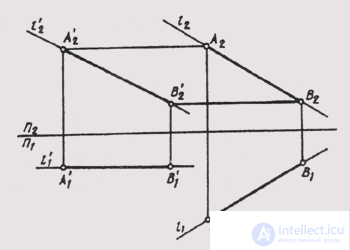Lecture
The method of plane-parallel movement is based on the fact that with parallel transfer of a geometric body relative to the plane of projections, its projection on this plane does not change its shape and size, although it changes position. Moreover, if a point moves in a plane parallel to P 1 , then its frontal projection is depicted as a straight line parallel to the axis P 2 / P 1 . If a point moves in a plane parallel to P 2 , then its horizontal projection is depicted as a straight line parallel to the same axis.
In fig. 107 shows a complex drawing of a straight AB. The straight line is not parallel to any of the projection planes. It is required with the help of plane-parallel movement to set it in such a position that it is parallel to one of the projection planes, for example, P 2 . Through an arbitrary point А 1 , we draw a straight line l 1 parallel to the axis П 2 / П 1 , and from this point on the straight line we postpone the segment equal to

Fig. 107
A 1 In 1 . From point А 1 we draw a vertical communication line, and from point AT, a horizontal line, at the intersection of which there will be a new position of frontal projection А 2 '. Similarly, we draw a vertical line of communication from point B 1 to the intersection with a horizontal line drawn from point B2. The new position of the frontal projection of point B is obtained at the intersection of these lines at point B 2 '.
After the drawing was transformed, the horizontal projection of the straight line AB became parallel to the plane P 2 , which means that it was projected onto this plane in full size.
Using the method of plane-parallel movement, it is possible to solve many problems associated with determining the actual size of segments, angles, plane figures, as well as setting the desired position. However, it is associated with a change in the position of a geometric figure in space. In practice, however, there are problems that, when transforming a complex drawing, are more convenient to leave the position of the projecting body unchanged and change the position of the projection planes.
Comments
To leave a comment
Descriptive Geometry and Engineering Graphics
Terms: Descriptive Geometry and Engineering Graphics